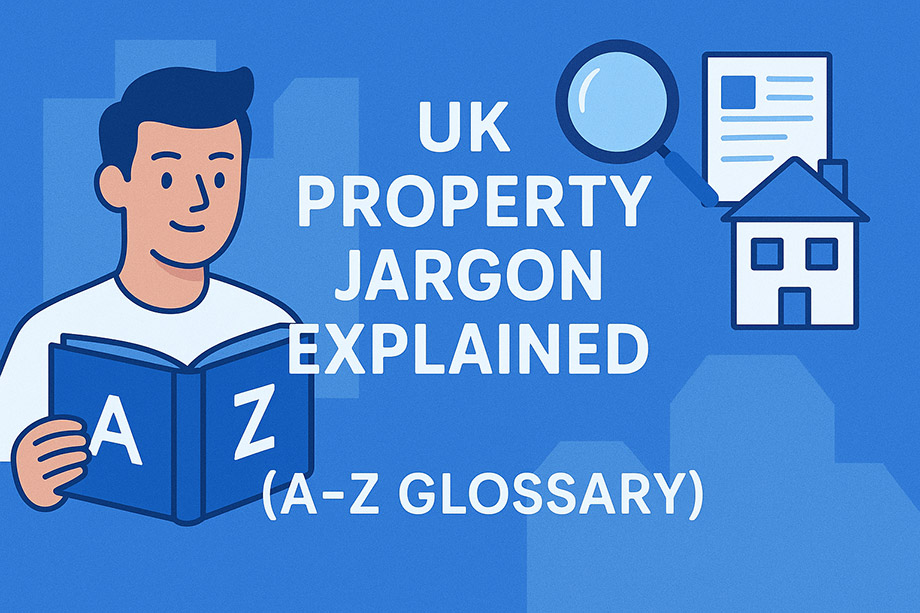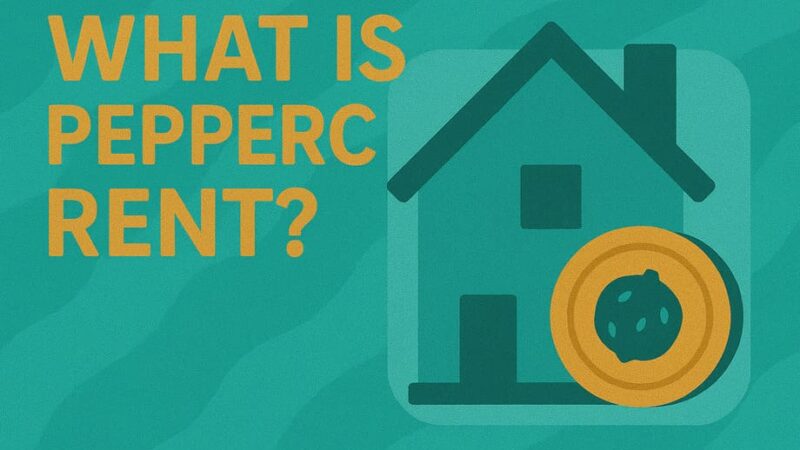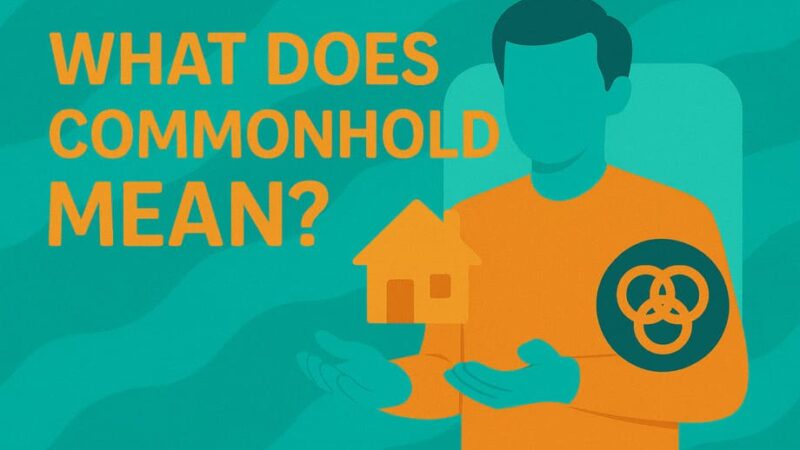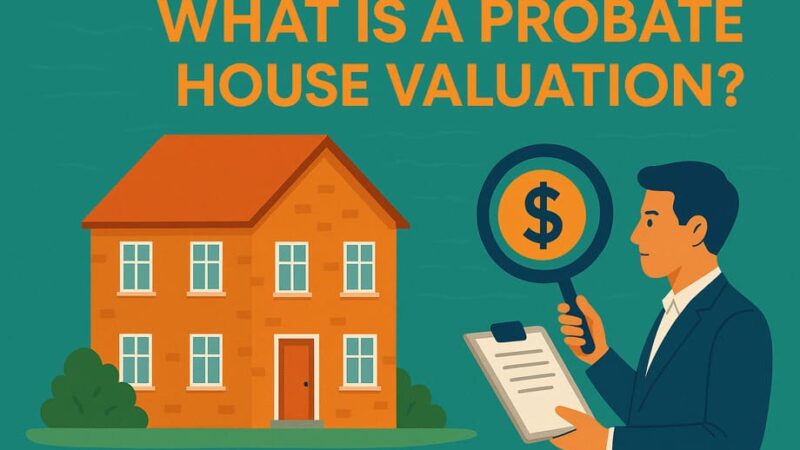UK Property Jargon Explained (A–Z Glossary)

Navigating the UK property market can feel like learning a foreign language. Whether you’re a first-time buyer trying to understand what “exchange” means, a renter confused by “AST” terminology, or a landlord getting to grips with Section 21 notices, the sheer volume of property jargon can be overwhelming.
This comprehensive A–Z glossary cuts through the confusion with clear, plain-English explanations of the most important property terms you’ll encounter. From “affordability checks” to “yield,” we’ve covered the essential vocabulary that buyers, renters, and landlords need to know.
We regularly update this glossary with new terms and link to detailed articles where you can dive deeper into specific topics. Bookmark this page as your go-to reference for decoding UK property speak.
A
Affordability Check Definition: An assessment by mortgage lenders to determine whether you can realistically afford loan repayments based on your income, outgoings, and lifestyle. Why it matters: This check can make or break your mortgage application, so understanding what lenders look for helps you prepare and improve your chances of approval.
AST (Assured Shorthold Tenancy) Definition: The most common type of rental agreement in England and Wales, typically lasting 6-12 months initially with automatic renewal. Why it matters: This determines your rights as a tenant or landlord, including notice periods and grounds for eviction, making it crucial to understand the terms.
Auction Definition: A public sale where properties are sold to the highest bidder, usually for quick sales or unusual properties. Why it matters: Auction purchases require immediate payment and completion within 28 days, so buyers need to be fully prepared with financing and legal checks beforehand.
B
Bridging Loan Definition: Short-term financing (usually 6-24 months) that “bridges” the gap between buying a new property and selling your current one. Why it matters: These loans carry higher interest rates but can help you secure a property quickly or buy before selling, though they come with significant financial risks.
Buildings Insurance Definition: Insurance that covers the structure of your property against damage from fire, flood, subsidence, and other perils. Why it matters: This is typically mandatory for mortgage holders and legally required for freeholders, protecting your biggest financial investment.
Buy-to-Let Definition: Purchasing property specifically to rent out to tenants for income, rather than living in it yourself. Why it matters: Buy-to-let mortgages have different criteria and higher deposit requirements, plus you’ll need to understand landlord responsibilities and tax implications.
C
Chain Definition: A sequence of linked property transactions where each buyer depends on selling their current property to fund their next purchase. Why it matters: Chains can cause delays or collapse entirely if one link fails, which is why “chain-free” properties are often preferred and may command higher prices.
Completion Definition: The final stage of a property transaction when ownership legally transfers, keys are handed over, and the purchase price is paid in full. Why it matters: This is when you actually become the legal owner, and timing must be coordinated with your mortgage, moving arrangements, and any property chain.
Conveyancing Definition: The legal process of transferring property ownership from seller to buyer, including searches, contracts, and registration. Why it matters: Poor conveyancing can lead to costly delays or legal issues, so choosing an experienced solicitor or conveyancer is essential for a smooth transaction.
D
Deposit (Purchase) Definition: The upfront payment (typically 5-20% of property value) that buyers contribute toward a property purchase, with the remainder covered by a mortgage. Why it matters: Larger deposits often secure better mortgage rates and lower monthly payments, making saving for a substantial deposit a key priority for buyers.
Deposit (Rental) Definition: Money paid by tenants (usually 1-6 weeks’ rent) as security against damage or unpaid rent, protected in a government-approved scheme. Why it matters: Understanding deposit protection rules helps tenants recover their money and helps landlords comply with legal requirements to avoid penalties.
E
Energy Performance Certificate (EPC) Definition: A rating (A-G) showing how energy-efficient a property is, required for all sales and rentals, valid for 10 years. Why it matters: Poor EPC ratings can affect property values and rental income, while upcoming regulations may require minimum standards for rental properties.
Equity Definition: The difference between your property’s current market value and the outstanding mortgage balance – essentially how much of the property you own outright. Why it matters: Building equity increases your wealth and can be released through remortgaging for home improvements, debt consolidation, or other investments.
Exchange Definition: The point when buyer and seller sign identical contracts and the sale becomes legally binding, with completion date confirmed. Why it matters: Once you exchange, pulling out means losing your deposit and potentially facing legal action, so ensure you’re completely certain before this point.
F
Freehold Definition: Complete ownership of both the property and the land it sits on, with no time limit or ground rent obligations. Why it matters: Freeholders have more control over their property and no ongoing costs to third parties, making freehold generally preferable to leasehold ownership.
Furnished vs Unfurnished Definition: Furnished rentals include furniture and appliances; unfurnished properties are empty or include only basic fixtures like kitchen units. Why it matters: Furnished properties typically command higher rents but involve more maintenance responsibilities for landlords and different tax deductions.
G
Gazumping Definition: When a seller accepts a higher offer from another buyer after already agreeing to sell to you, but before contracts are exchanged. Why it matters: Gazumping can cost buyers thousands in wasted survey and legal fees, though it’s legal until exchange, making speed important in competitive markets.
Gazundering Definition: When a buyer reduces their offer at the last minute before exchange, often due to survey issues or market changes. Why it matters: While frustrating for sellers, gazundering is legal before exchange and sometimes necessary if problems are discovered with the property.
Ground Rent Definition: Annual payment made by leaseholders to the freeholder for the land their property sits on, typically £100-£500 per year. Why it matters: Ground rent is an ongoing cost that affects affordability, and some modern leases include escalating ground rents that can become prohibitively expensive.
Guarantor Definition: Someone (usually a parent or family member) who agrees to pay rent and other tenancy costs if the tenant cannot. Why it matters: Guarantors help tenants with limited income or credit history secure rentals, but guarantors take on significant financial responsibility.
H
HMO (House in Multiple Occupation) Definition: A property where three or more unrelated people share facilities like kitchens or bathrooms, requiring special licensing and safety standards. Why it matters: HMOs can generate higher rental yields but involve additional licensing costs, safety requirements, and management complexity.
Holding Deposit Definition: Payment (usually one week’s rent) made by prospective tenants to reserve a property while references and paperwork are completed. Why it matters: This demonstrates serious intent but has strict legal rules about when it can be retained or must be returned to the tenant.
I
Insurance (Contents) Definition: Coverage for personal belongings inside your property against theft, damage, or loss. Why it matters: While not legally required, contents insurance protects valuable possessions and is often required by mortgage lenders or landlords.
Interest-Only Mortgage Definition: A mortgage where monthly payments only cover interest charges, with the full loan amount due at the end of the term. Why it matters: Lower monthly payments can help cash flow, but you need a solid repayment strategy to pay off the capital, making this option riskier.
J
Joint Tenancy Definition: A form of property ownership where two or more people own equal shares and survivors automatically inherit if one dies. Why it matters: This provides security for couples but can complicate matters if relationships break down, as all owners must agree to sell.
K
Key Money Definition: An illegal practice where tenants are charged extra fees just to secure a rental property, beyond legitimate deposits and rent. Why it matters: Requesting key money is against the law under tenant fee legislation, and tenants should report any such demands to local authorities.
L
Land Registry Definition: The government department that records property ownership, boundaries, and charges like mortgages across England and Wales. Why it matters: Land Registry records provide legal proof of ownership and can reveal important information about property history and any legal restrictions.
Leasehold Definition: Ownership of a property for a fixed period (often 99-999 years) while someone else owns the land, involving ground rent and service charges. Why it matters: Leaseholds come with ongoing costs and restrictions, and short leases can be difficult to mortgage or sell, potentially requiring expensive lease extensions.
Let Agreed Definition: Estate agent terminology indicating a rental property has been provisionally let to tenants, subject to references and contract signing. Why it matters: This status means the property is off the market temporarily, but may become available again if the application falls through.
M
Mortgage in Principle Definition: A conditional statement from a lender indicating how much they might lend you, based on basic affordability checks. Why it matters: This helps you set a realistic budget and shows sellers you’re a serious buyer, though it’s not a guarantee of final mortgage approval.
Multiple Agency Definition: When a seller instructs several estate agents to market their property simultaneously, with commission paid to whoever finds the buyer. Why it matters: This can mean wider marketing reach but potentially higher fees, and buyers may encounter the same property listed by different agents.
N
Negative Equity Definition: When your outstanding mortgage balance exceeds your property’s current market value. Why it matters: This can trap homeowners who cannot sell without making a loss, limiting mobility and remortgaging options until values recover.
No Onward Chain Definition: When a seller doesn’t need to buy another property (perhaps because they’re downsizing or moving abroad), removing chain-related delays. Why it matters: Chain-free properties often complete faster and are less likely to fall through, making them attractive to buyers despite potentially higher prices.
O
Offers Over Definition: A pricing strategy where the advertised price is the minimum the seller will accept, with sealed bids invited from interested buyers. Why it matters: Common in Scotland and competitive markets, this can drive prices above the guide figure, so budget accordingly and research comparable sales.
Overpriced Definition: When a property’s asking price exceeds its realistic market value based on location, condition, and comparable sales. Why it matters: Overpriced properties often sit on the market longer, and buyers should research local values to make realistic offers and avoid overpaying.
P
Part Exchange Definition: A scheme where property developers or house builders buy your existing home as part payment for a new property purchase. Why it matters: This can simplify moving and avoid chains, but developers often value existing properties below market rate, so compare costs carefully.
Planning Permission Definition: Local authority approval required for building work, extensions, or changes of use that go beyond permitted development rights. Why it matters: Properties with planning permission for extensions or conversions may command higher prices, while those needing permission carry uncertainty and costs.
Q
Quiet Enjoyment Definition: A tenant’s legal right to use their rental property without unnecessary interference from the landlord. Why it matters: Landlords must give proper notice before visits and cannot harass tenants, while tenants can take legal action if this right is violated.
R
Rent in Advance Definition: Payment of future rent upfront, typically one month but sometimes several months in advance. Why it matters: This provides security for landlords but affects tenant cash flow, and any advance rent over one month should be protected in a deposit scheme.
Right to Buy Definition: The legal right for eligible council and housing association tenants to purchase their home at a discount. Why it matters: This can provide a route to homeownership at below-market prices, but there are eligibility criteria and restrictions on future sales.
S
Searches Definition: Legal investigations into factors affecting a property, including local authority plans, environmental risks, and drainage arrangements. Why it matters: These can reveal hidden problems like flood risks or planned developments that could affect your enjoyment or the property’s value.
Section 21 Definition: A legal notice that allows landlords to evict tenants without giving a reason, requiring two months’ notice after the fixed term ends. Why it matters: This affects tenancy security and is currently under review by the government, potentially changing the rental landscape significantly.
Service Charge Definition: Annual fees paid by leaseholders for communal area maintenance, building insurance, and shared services like lifts or gardens. Why it matters: These charges can be substantial and unpredictable, affecting affordability and sometimes leading to disputes between leaseholders and management companies.
Shared Ownership Definition: A part-buy, part-rent scheme where you purchase a share (typically 25-75%) of a property and pay rent on the remainder. Why it matters: This provides a route to homeownership with smaller deposits, but involves ongoing rent payments and restrictions on selling or subletting.
Sole Agency Definition: An exclusive agreement where only one estate agent markets your property for a specified period. Why it matters: This typically results in lower commission rates and more focused marketing effort, but limits your property’s exposure compared to multiple agency.
SSTC (Sold Subject to Contract) Definition: Estate agent status indicating a sale has been agreed but contracts haven’t been exchanged, meaning the deal could still fall through. Why it matters: Properties marked SSTC are off the market but deals can collapse, so it’s worth monitoring these properties if you’re interested in similar homes.
Stamp Duty Definition: Government tax paid by property buyers, with rates varying based on purchase price, buyer status, and property type. Why it matters: This represents a significant additional cost (potentially tens of thousands of pounds) that must be budgeted for alongside deposits and legal fees.
Survey Definition: A professional inspection of a property’s condition, ranging from basic valuations to comprehensive structural assessments. Why it matters: Surveys can reveal expensive defects that affect your offer or decision to proceed, potentially saving thousands in unexpected repair costs.
T
Tenancy Agreement Definition: The legal contract between landlord and tenant setting out rights, responsibilities, and terms of the rental arrangement. Why it matters: This document governs your entire tenancy, so understanding all clauses helps avoid disputes and ensures both parties know their obligations.
Title Deeds Definition: Legal documents proving ownership of a property and detailing any restrictions or rights affecting the land. Why it matters: These provide ultimate proof of ownership and reveal any legal issues that could affect your use or future sale of the property.
U
Under Offer Definition: Estate agent status indicating an offer has been accepted but the sale hasn’t yet progressed to exchange of contracts. Why it matters: Properties under offer are temporarily off the market, but deals can still fall through, so it may be worth expressing interest as a backup buyer.
Unmortgageable Definition: Properties that lenders consider too risky to provide standard mortgages for, often due to construction type, location, or condition. Why it matters: These properties may be cheaper but require cash purchases or specialist lending, limiting both buyers and future resale options.
V
Valuation Definition: A professional assessment of a property’s market value, either for mortgage purposes or to determine asking prices. Why it matters: Accurate valuations ensure realistic pricing and mortgage approvals, while overvaluations can lead to failed sales or lending issues.
Void Period Definition: Time when a rental property is empty between tenancies, generating no rental income while costs continue. Why it matters: Void periods directly impact landlord profitability, making tenant retention and quick re-letting crucial for investment success.
W
Wayleave Definition: Permission granted to utility companies or others to install equipment or access land, often in exchange for annual payments. Why it matters: Existing wayleaves can provide small income streams but may restrict future development, while new ones require careful consideration of long-term implications.
Y
Yield Definition: The annual rental income from a property expressed as a percentage of its purchase price or current value. Why it matters: Yield helps investors compare different properties and locations, though it should be considered alongside capital growth potential and investment costs.
Z
Zero Deposit Scheme Definition: Alternative to traditional rental deposits where tenants pay a fee or premium instead of providing a large upfront deposit. Why it matters: These schemes can help tenants with limited savings access rentals, but may cost more long-term and still require landlord approval.
This glossary is regularly updated with new terms and industry changes. For more detailed explanations of specific topics, explore our comprehensive property guides and resources.
Last Updated on August 1, 2025 by James Cartwright







